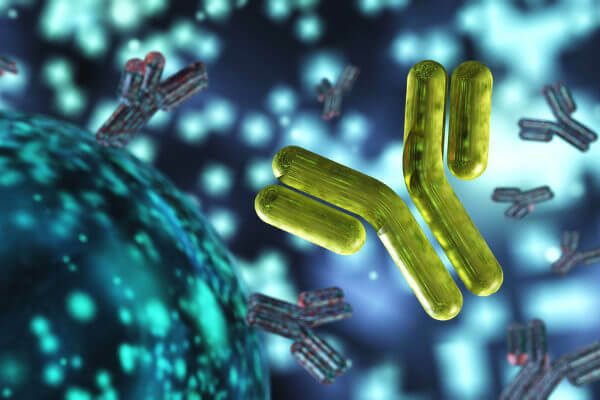Antigen, antibody and vaccination are three important terms that we must know better to understand how the process of immunization. Next, we will define what is antigen, antibody and vaccine, and we will better understand the relationship between them.
What are antigens?
You antigens can be defined as substances capable of binding an antibody. In the literature, it is also said that any substance that is capable of producing a response from the system immune can be considered an antigen, however, this definition has some flaws, since not every antigen is capable of activating an immune response.
It is worth noting that a substance capable of triggering an immune system response is more correctly called immunogen. Every immunogen is therefore considered an antigen, but not every antigen is an immunogen. There are also molecules called hapten, which are molecules capable of reacting with an antibody, but not capable of inducing an adaptive immune response.
Molecules present in viruses, bacteria, protozoa and fungi are well-known examples of antigens.
Read too: Vector and etiological agent
What are antibodies?
Antibodies are plasma glycoproteins that interact in a specific way with a particular antigen that stimulated their production. These glycoproteins are produced by plasma cells, which are cells formed from the differentiation of B lymphocytes.

Antibodies act by ensuring the destruction or inactivation of antigens.
→ Antibody function
Youantibodies they affect, in different ways, the agent that caused their production. They work by binding to antigens, interfering with their normal activity or tagging them to ensure their destruction or inactivation.
See below some mechanisms of action of antibodies:
Neutralization: In this process, antibodies bind to the surface of the antigens, preventing the infection of a cell, thus rendering the antigen harmless.
Opsonization: In this process, antibodies bind to antigens, signaling that structure to cells that will phagocytize them (macrophages or neutrophils).
Complement system activation and pore formation: In this process, the antibodies act by ensuring the activation of the complement system, which triggers an attack on the foreign cell membrane, forming a pore. This pore allows the entry of ions and water, triggering the cell to break down.
Read too: Serum and vaccine
Difference between antigen and antibodies
We can say, in a nutshell, that antigens are molecules that react with antibodies, while antibodies are proteins, produced by plasma cells, which basically act to ensure the inactivation or destruction of the antigen.
Antigen |
Antibody |
Molecule that reacts with the antibody. |
A protein that acts to try to inactivate or destroy an antigen. |
Vaccination
Vaccines are immunizing agents manufactured from inactive or attenuated antigens (incapable of causing disease) that stimulate our immune system. After taking the vaccine, the individual starts to produce antibodies against that agent and memory cells, the latter being responsible for triggering a quick answer, in case our body is later subjected to the encounter of that antigen.

Vaccination was responsible for the eradication of several diseases.
Vaccines, which are ways of immunizationactive, they act in the prevention of certain diseases, not being effective when a person has already acquired the disease. Currently, several diseases have effective vaccines, which is the case of diseases such as rubella, mumps, hepatitis B, yellow fever, tetanus, measles, among many others.
There are vaccines that can be given by injection or given orally. In the latter case, we can mention the Oral Polio Vaccine (VOP), which protects against polio, also known as infantile paralysis.
5 myths about vaccination
People who do not use vaccines for fear of some problems that may be caused by these immunizing agents are increasingly common. The fact is that vaccines are safe, however, many myths still surround vaccination. Here are 5 myths about vaccination and why you shouldn't believe them.
Myths about vaccination |
|
|
|
|
|
Read too: Vaccines All Children Should Take
→ Relationship between antigen, antibody and vaccination
Once you understand what antigen, antibody, and vaccine are, it's easy to understand the relationship between them. Antigens are agents that react with an antibody and can trigger diseases in our body, whereas antibodies are proteins that try to protect our body against antigens.
Vaccination, in turn, ensures that inactive or attenuated antigens are placed in our body in order to guarantee the production of specific antibodies and memory cells. In this way, when a person is exposed to that antigen, the body is already prepared to guarantee protection.
Read too:Importance of vaccination
By Ma. Vanessa Sardinha dos Santos
Source: Brazil School - https://brasilescola.uol.com.br/biologia/antigeno-anticorpo-vacinacao.htm
